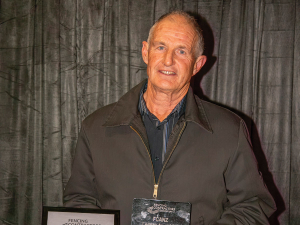Simple engineering automation and computer programs can solve many issues, he told the Agcarm summer conference.
An in-field ‘robotics revolution’ is coming, says Duke.
And with the research now solving problems here is an excellent opportunity to export high value machinery worldwide.
He says an example of obsolete machinery and the use of relatively simple automation to solve problems is seen in work done for a large NZ forestry company.
“It plants six million seedlings every year -- all manually. The cuttings are taken off and dropped into holes and harvested in a year or so.”
The holes are made by a spiked wheel or manually using a spiked board.
The spikes dig a trough, but the seedlings do not grow correctly if the trough is not straight.
Duke outlined a research project that designed a robotic digging machine to precisely drill the holes.
“There are a lot of technology changes that enable us to build machinery quickly using computer aided design.”
The robotic digging machine -- ‘Debbie the Digger’ -- is pulled behind a tractor and the computer works out how to drill the hole. Using encoders and sensors it ensures the rig drills straight holes.
‘Debbie’ has precisely drilled at least 20 million holes during its three-four year life.
The workers no longer have to straighten the seedling in the hole, so they can plant two at a time.
“They got improved productivity; they just dropped them in the holes and got beautiful nice straight seedlings.”
The machine solved that problem and had a knock-on effect of solving problems further down the line.
“That is smart computer-controlled, not too hi-tech equipment introduced to replace obsolete machinery,” he says. “I reckon there are thousands of machines to replace and NZ almost needs to have a regime to start doing this.”
Robots to harvest kiwifruit
A $10 million horticultural robotics project is researching harvesting kiwifruit robotically.
“Can we harvest kiwifruit robotically? Mike Duke asks. “Can we navigate around orchards with robots? Can we pollinate kiwifruit flowers robotically?”
“Driverless car technology is very applicable to robotics because ultimately you will have vehicles self-driving around farms and orchards.”
Driverless tractors that navigate by GPS are already in use. Researchers are looking at the next level -- fully autonomous agricultural vehicles.
They are looking at a kiwifruit prototype using electric engines which scan the vines. They envisage that by year-end it will be able to get around two or three orchards with no human input. It now can get around an orchard, but a lot of work remains to ensure it is safe, including trialling dummies in the front.
A kiwifruit harvesting device under research uses machine vision to find and pick the kiwifruit. It creates a 3D map of where the kiwifruit are and schedules how they will be picked.
“If you are taking these images for harvesting they could also monitor for diseases,” says Duke. “If you can train it to recognise a flower, you can train it to recognise a stink bug or a caterpillar or a disease.”
MBIE, Auckland and Waikato universities, Plant and Food Research and Robotics Plus, the originators of the work, are all involved.

















